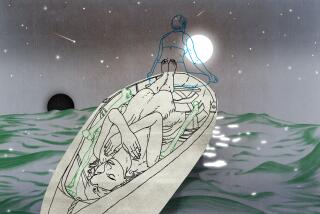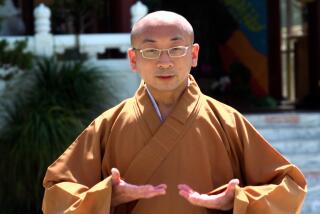A Guidebook for the ‘Final Voyage’
The Tibetan Book of the Dead is full of instructions from the Buddhist perspective about how to manage a skillful passage into the next life. But one of the best ways to prepare for death, according to Buddhist scholar Robert Thurman, is to live a good life.
Here are a few suggestions on how to prepare for the “final voyage,” culled from Thurman’s commentaries on the Book of the Dead:
* Become informed. Develop a clear picture of what to expect by becoming aware of the physical, psychological and spiritual dimensions of the death experience.
* Use your imagination. Develop a positive imagination about life after death. Buddhist sutras are full of descriptions of heavenly realms. Those with roots in other religious traditions should read up on the visions of their own mystics. Secularists should look into accounts of near-death or post-death experience.
* Improve your ethics. Build up generosity, sensitivity to others and tolerance. These are not specifically mentioned in the Book of the Dead. But in Buddhist societies their necessity is taken for granted. Western religions teach the same virtues. Practice giving things away and observe the mental processes that accompany the act of releasing the things you like.
* Meditate. Begin with short sessions of calming meditation, five or 10 minutes at a time, observing your breaths, counting them, relaxing. Always stop the sessions while you are enjoying them; never prolong until you are tired.
Once you come to enjoy the practice, choose a meditation object. If you are a Buddhist, an image of the Buddha will do. If you are Christian, an icon of Jesus. If you are a Muslim, a sacred letter. If you are a secularist, the Mona Lisa, a flower, a satellite photo of the planet. Then devote short sessions to keeping your attention on the subject without distraction.
* Practice. You can convert the process of falling asleep into a rehearsal for the dissolutions of death. Imagine yourself sinking away from ordinary consciousness into deep sleep. Convert the dream state into a practice for the state you will experience after death by trying to recognize yourself as dreaming while you dream. This is difficult. But if you can develop a practice of lucid dreaming, you have a much better chance of managing the dissolutions of the death.
* Be positive. The point of meditation and of maintaining a generous, optimistic attitude is to create a stream of positive energy, which is especially valuable in the death crisis. This positive stream of energy can carry you over the rough spots of the death experience.

